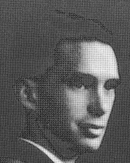Bruno Touschek
| Bruno Touschek | |
|---|---|
 |
|
| Born |
3 February 1921 Vienna, Austria |
| Died | 25 May 1978 (aged 57) Innsbruck, Austria |
| Residence | Italy, Austria, Germany |
| Fields | Accelerator physics, Particle physics |
| Institutions | Istituto Nazionale di Fisica Nucleare |
| Alma mater | University of Göttingen, University of Glasgow |
| Doctoral advisor | John Currie Gunn |
| Other academic advisors | Rudolf Peierls |
| Known for | electron-positron collider |
| Notable awards | Matteucci Medal (1975) |
Bruno Touschek (3 February 1921 – 25 May 1978) was an Austrian physicist, a survivor of the Holocaust, and initiator of research on electron-positron colliders.
Touschek was born and attended school in Vienna. In 1937, he was not allowed to finish high school since his mother was Jewish. He passed the final year exam in a different school as an external pupil. Shortly after he started studying physics and mathematics at the University in Vienna, he again had to quit for racial reasons. Thanks to a couple of friends, he could keep on studying in Hamburg, where nobody knew of his origins. In order to make a living, he took up several jobs at the same time.
During this period, he worked at the Studiengesellschaft für Elektronengeräte, a company affiliated to Philips, where "drift tubes" - the forerunners of the klystron - were being developed at that time. In 1943, he asked Rolf Widerøe to cooperate with him in building a betatron, critically studying an article of Donald Kerst. In the following, Touschek, Widerøe, R. Kollath and G. Schumann worked on a 15 MeV betatron, which was constructed near Hamburg and was operational in 1944. When Touschek was arrested by the Gestapo in 1945, Widerøe visited him in prison, and during these meetings they continued to talk about the betatron. In particular, Touschek conceived the idea of radiation damping for electrons circulating in a betatron.
Touschek escaped the Kiel concentration camp to which he would have been deported to largely by chance. During the death march from the Hamburg prison, Touschek was shot by an SS officer, presumed being dead, and thus left behind. After the war, he graduated from the University of Göttingen in 1946, where he came into contact with Werner Heisenberg and Carl Friedrich von Weizsäcker, and finished his diploma thesis.
...
Wikipedia
